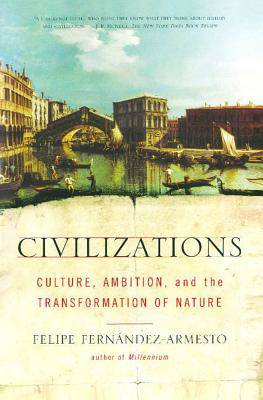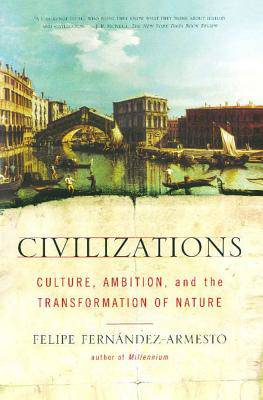
- Afhalen na 1 uur in een winkel met voorraad
- Gratis thuislevering in België vanaf € 30
- Ruim aanbod met 7 miljoen producten
- Afhalen na 1 uur in een winkel met voorraad
- Gratis thuislevering in België vanaf € 30
- Ruim aanbod met 7 miljoen producten
Zoeken
Civilizations
Culture, Ambition, and the Transformation of Nature
Felipe Fernandez-Armesto
Paperback | Engels
€ 48,95
+ 97 punten
Omschrijving
Erudite, wide-ranging, a work of dazzling scholarship written with extraordinary flair, Civilizations redefines the subject that has fascinated historians from Thucydides to Gibbon to Spengler to Fernand Braudel: the nature of civilization.
To the author, Oxford historian Felipe Fernández-Armesto, a society's relationship to climate, geography, and ecology are paramount in determining its degree of success. "Unlike previous attempts to write the comparative history of civilizations," he writes, "it is arranged environment by environment, rather than period by period or society by society." Thus, for example, tundra civilizations of Ice Age Europe are linked with those of the Inuit of the Pacific Northwest, the Mississippi Mound Builders with the deforesters of eleventh-century Europe.
Civilizations brilliantly connects the world of ecologist, geologist, and geographer with the panorama of cultural history.
To the author, Oxford historian Felipe Fernández-Armesto, a society's relationship to climate, geography, and ecology are paramount in determining its degree of success. "Unlike previous attempts to write the comparative history of civilizations," he writes, "it is arranged environment by environment, rather than period by period or society by society." Thus, for example, tundra civilizations of Ice Age Europe are linked with those of the Inuit of the Pacific Northwest, the Mississippi Mound Builders with the deforesters of eleventh-century Europe.
Civilizations brilliantly connects the world of ecologist, geologist, and geographer with the panorama of cultural history.
Specificaties
Betrokkenen
- Auteur(s):
- Uitgeverij:
Inhoud
- Aantal bladzijden:
- 560
- Taal:
- Engels
Eigenschappen
- Productcode (EAN):
- 9780743202497
- Verschijningsdatum:
- 1/06/2002
- Uitvoering:
- Paperback
- Formaat:
- Trade paperback (VS)
- Afmetingen:
- 155 mm x 234 mm
- Gewicht:
- 635 g

Alleen bij Standaard Boekhandel
+ 97 punten op je klantenkaart van Standaard Boekhandel
Beoordelingen
We publiceren alleen reviews die voldoen aan de voorwaarden voor reviews. Bekijk onze voorwaarden voor reviews.











